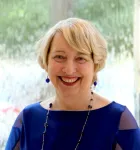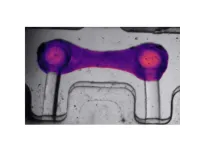(Press-News.org) Cathie Biga, MSN, FACC, today became president of the American College of Cardiology and made history as the organization’s first non-physician president. She will serve a one-year term representing over 56,000 cardiovascular care team members around the world and leading the cardiovascular organization in its mission to transform cardiovascular care and improve heart health for all.
“I’m excited to bring my own set of leadership skills and perspectives to the ACC as we kick off the first year of our new Strategic Plan and celebrate the College’s 75th anniversary,” she said. “The concept of ‘standing on the shoulders of giants’ is often referenced when talking about leadership changes and transformation over time. This concept is certainly true for me. There have been incredible leaders throughout the College’s 75-year history and it’s a true privilege to follow in their footsteps.”
Biga has been an ACC member for over 25 years, during which time she served on multiple committees, including the Health Affairs Committee, Finance Committee and Cardiovascular Management Council and was the inaugural chair of MedAxiom’s Board of Managers. She’s been a member of the ACC Board of Trustees for six years, most recently serving as vice president.
As president and CEO of Cardiovascular Management of Illinois, a cardiology physician practice management company, she has worked with more than 100 providers in the Chicago area and partners in their cardiovascular service lines at 14 acute care hospitals. She has more than 40 years of experience as a registered nurse, service line director, hospital vice president and CEO, as well as 25 years of experience in physician practice management.
Biga lists one of her biggest accomplishments as being able to support the ACC as it evolved and embraced the culture of team-based care. She has been integral in that change, becoming one of only 72 cardiovascular team members out of almost 30,000 members who has achieved Fellow of the American College of Cardiology (FACC) designation based on her professional achievements.
“I have led throughout my career in a dyad model and my year as president will be no different,” she said. “I bring extensive experience in cardiovascular health care delivery, innovation, quality and economic sustainability that I believe offers fresh perspectives and complements the competencies of my physician colleagues on the Board of Trustees. While my leadership in cardiology is on the administrative side, the end goals of optimizing patient care in physician led teams and optimizing patient outcomes are the same.”
Other new officers for 2024-25 are Vice President Christopher Kramer, MD, FACC; Treasurer Akshay K. Khandelwal, MD, FACC; Board of Trustees Members Bonnie Ky, MD, MSCE, FACC, and Lee R. Goldberg, MD, MPH, FACC; Board of Governors Chair Himabindu Vindula, MD, MS, FACC; and Board of Governors Chair-Elect David E. Winchester, MD, MS, FACC.
The American College of Cardiology (ACC) is the global leader in transforming cardiovascular care and improving heart health for all. As the preeminent source of professional medical education for the entire cardiovascular care team since 1949, ACC credentials cardiovascular professionals in over 140 countries who meet stringent qualifications and leads in the formation of health policy, standards and guidelines. Through its world-renowned family of JACC Journals, NCDR registries, ACC Accreditation Services, global network of Member Sections, CardioSmart patient resources and more, the College is committed to ensuring a world where science, knowledge and innovation optimize patient care and outcomes. Learn more at www.ACC.org or follow @ACCinTouch.
###
END
Embargoed for release until 5:00 p.m. ET on Monday 8 April 2024
Annals of Internal Medicine Tip Sheet
@Annalsofim
Below please find summaries of new articles that will be published in the next issue of Annals of Internal Medicine. The summaries are not intended to substitute for the full articles as a source of information. This information is under strict embargo and by taking it into possession, media representatives are committing to the terms of the embargo not only on their own behalf, ...
The U.S. Department of Energy’s Office of Technology Transitions (OTT) selected Texas Innovates, a non-profit organization focused on hydrogen and carbon innovation and expansion in the greater Houston and Gulf Coast region, as one of 23 phase 1 winners of the Energy Program for Innovation Clusters (EPIC) Round 3 competition. Notably, Texas Innovates is the only Texas entity to advance to phase 2 of the competition.
“We have been working towards this day since we identified the need for energy hardware incubation in 2017 and were a finalist in 2019 for C40 Cities global competition to make Houston’s Velasco Incinerator ...
A Pulse of Innovation: AI at the Service of Heart Research
Columbia biomedical engineers use AI to build a transformative new tool to study and diagnose heart function
Understanding heart function and disease, as well as testing new drugs for heart conditions, has long been a complex and time-consuming task. A promising way to study disease and test new drugs is to use cellular and engineered tissue models in a dish, but existing methods to study heart cell contraction and calcium handling require a good deal of manual work, are prone to errors, and need expensive specialized equipment. There clearly is a critical medical ...
Despite having an overall survival rate of 94%, B-cell acute lymphoblastic leukemia (B-ALL), the most common childhood cancer, can prove challenging to treat, with survival among relapsed or resistant cases falling between 30-50%. Recent work by St. Jude Children’s Research Hospital scientists discovered which tumor cells resist treatment and why. This enabled the rational design of a combination therapy that better controlled high-risk subtypes of B-ALL in mouse models. The findings were published today in Cancer Cell.
“We found a new explanation of B-ALL ...
Key takeways
UCLA psychologists asked experiment participants to choose to receive $40 in seven days or $60 in 30 days, for example, under a variety of time constraints.
The experiment showed that people tend to make more impulsive decisions if they think about time delays first, and more patient decisions if they think about the greater reward associated with waiting longer.
The findings could be applied where people are being encouraged to make life choices that will benefit them in the long run, such as eating healthier, exercising or saving for retirement, by emphasizing the future large rewards and deemphasizing ...
EMBARGOED UNTIL APRIL 8, 2024 AT 3:00 PM U.S. ET/ 12:00 PM PT
Over the past four years, many of us have become accustomed to a swab up the nose to test for COVID-19, using at-home rapid antigen tests or the more accurate clinic-provided PCR tests with a longer processing time. Now a new diagnostic tool developed by UC Santa Cruz Distinguished Professor of Electrical and Computer Engineering Holger Schmidt and his collaborators can test for SARS-CoV-2 and Zika virus with the same or better accuracy as high-precision PCR tests in a matter of hours.
In a new paper in the journal Proceedings of the National Academy of Sciences, Schmidt ...
Pregnancy may carry a cost, reports a new study from the Columbia University Mailman School of Public Health. The research, carried out among 1735 young people in the Philippines, shows that women who reported having been pregnant looked biologically older than women who had never been pregnant, and women who had been pregnant more often looked biologically older than those who reported fewer pregnancies. Notably, the number of pregnancies fathered was not associated with biological aging among same-aged cohort ...
University of Michigan researchers have discovered that a worm commonly used in the study of biology uses a set of proteins unlike those seen in other studied organisms to protect the ends of its DNA.
In mammals, shelterin is a complex of proteins that "shelters" the ends of our chromosomes from unraveling or fusing together. Keeping chromosomes from fusing together is an important job: chromosomes carry our body's DNA. If chromosome ends fuse, or if they fuse with other chromosomes, ...
One of the most abundant and deadliest organisms on earth is a virus called a bacteriophage (phage). These predators have lethal precision against their targets – not humans, but bacteria. Different phages have evolved to target different bacteria and play a critical role in microbial ecology. Recently, ADA Forsyth scientists exploring the complex interactions of microbes in the oral microbiome discovered a third player influencing the phage-bacterial arms race – ultrasmall bacterial parasites, called Saccharibacteria or TM7.
In the study, which appeared in Proceedings of the National Academy of Sciences ...
Some deeper areas of the Great Barrier Reef are insulated from harmful heatwaves – but that protection will be lost if global warming continues, according to new research.
High surface temperatures have caused mass “bleaching” of the Great Barrier Reef in five of the last eight years, with the latest happening now.
Climate change projections for coral reefs are usually based on sea surface temperatures, but this overlooks the fact that deeper water does not necessarily experience the same warming as that at the surface.
The new study – ...







